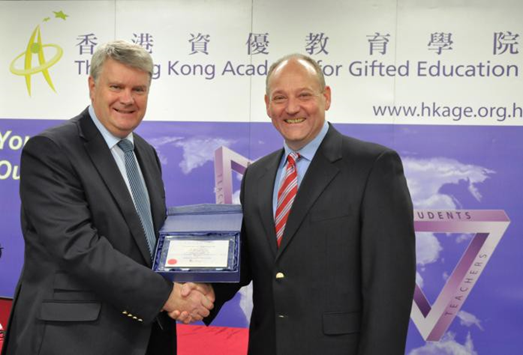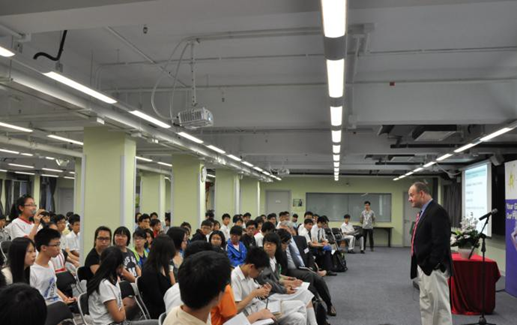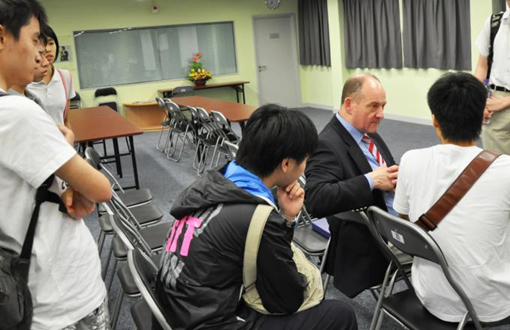The HKAGE Collaborating with University of Oxford Gifted Students Challenged to Understand University Research on “Sleeplessness”
(Hong Kong – 14 May 2012) The Hong Kong Academy for Gifted Education (HKAGE) collaborated with the University of Oxford to organise a science seminar, entitled “The Rhythms of Life - The Biological Clocks that Control the Daily Lives of Every Living Thing” on last Friday (11 May) at the HKAGE. At the seminar, which attracted more than 200 gifted secondary students to participate, Dr. Russell Foster, Professor of Circadian Neuroscience and Head of the Nuffield Laboratory of Ophthalmology at the University of Oxford, talked about his new findings on biological clock and provided new insights on the causes and effects of sleeping problems.
Professor Foster’s novel findings illustrated how the third class of photoreceptors in eyes react to light and thus regulate people’s biological clock, sleep, hormone release and even pupil constriction. The findings are vital in exploring the importance of sleep to health. He said under normal conditions, people experienced a 24 hour pattern of light and dark and the clock used this signal to align biological time to the day and night. The clock then anticipates different demands of the 24 hour day and adjusts our biology in advance of the changing conditions. For examples, body temperature drops, blood pressure decreases and tiredness increases in anticipation of going to bed. Whilst before dawn, our metabolism is geared-up in anticipation of increased activity.
From the research, Professor Foster also investigated how sleep affects children’s development and performance. He further explained the correlation between sleep and health problems such as depression, decreased cognitive performance and reduced immunity to diseases. He said ignorance of the rhythms of life could harm our health and quality of life, “Sleep allows us to find novel solutions to complex problems. The stabilization of sleep can have positive effects on psychiatric illness.”
Professor Foster said that research is never easy; there are always barriers, but he encouraged students to persist in their faith and never give up. “Our initial approach was to use mice with genetic disorders that resulted in profound loss of the visual cells within the eye. To our amazement these mice were able to adjust their clocks to light. Thus, we proposed that the eye may have another “third” photoreceptor within the eye. However, this idea was met with huge opposition initially on the basis that scientists have studied the eye for 150 years and that all the important aspects of eye function were well understood. There was no room for another receptor. This resistance spurred us on, and eventually led to the discovery that mice and even humans have a small population of cells that are sensitive to light. It’s great to be proved correct!” said Professor Foster.
Participating gifted students were challenged to understand world-class research in neuroscience at university level. They were excited to be given the opportunity to exchange their ideas with Professor Foster and this set off an animated discussion at the event.
Professor Foster shared his story, “I went to university and studied zoology, thinking I would become a marine biologist as I was always fascinated by the life around the sea and I was a keen swimmer. In a second-year-laboratory class, we recorded the electrical responses from the eye of a locust. I was enthralled that you could measure the specific responses to light from a part of the nervous system.”He told the students to open their eyes so as to discover more of their interests. The students treasured the sharing with Professor Foster and they all enjoyed this joyful and fruitful learning journey so much.
Dr Stephen Tommis, Executive Director of the HKAGE, said the seminar stimulated the gifted students’ interest in science and research and provided an opportunity for them to experience the teaching methodology and feel first hand the charisma of a world-class academic, which was a valuable experience. Besides Dr. Foster, the HKAGE has invited other academics from the University of Oxford and similar world class universities in the past to teach our student members with the aim of exposing them to new learning experiences.
Professor Foster is accompanying the University of Oxford Vice-Chancellor Andrew Hamilton on his visit to Asia including Hong Kong, Beijing and Tokyo. Professor Foster’s research interests range across many areas, such as visual neuroscience, circadian rhythms and sleep. One of his most vital research findings has been the discovery of a third class of photoreceptor within the vertebrate eye. Professor Foster and his research group have established a Centre for Sleep and Circadian Neuroscience within the Biomedical Centre at Oxford to place the related findings into a clinical context. The centre is working towards an understanding of the causes of sleep and circadian rhythm disturbance in neurological disorders, such as schizophrenia, bipolar disorder and dementia.
Professor Foster is President-elect of the British Neuroscience Association. He has won several international awards including Edridge Green Medal from the Royal College of Ophthalmologist, 2005 and Cogan Award (USA), 2001 etc. He has authored over 140 papers and books, with the latest publication, Sleep – a Very Short Introduction published by the Oxford University Press this year.
 |
Dr Tommis (left) expressed the gratitude to Professor Foster for his enlightened sharing. |
 |
Students enjoyed exchanging ideas with Professor Foster. |
 |
Some students stayed after the talk to learn more from Professor Foster. |






